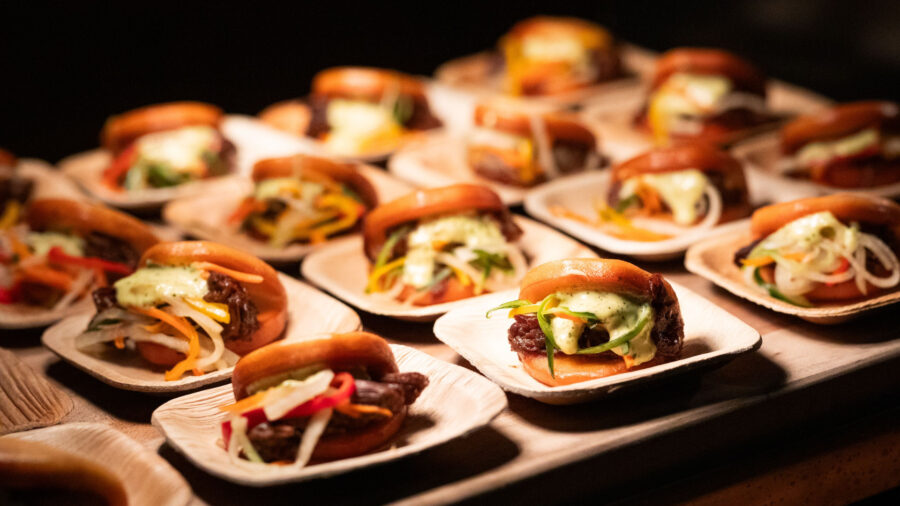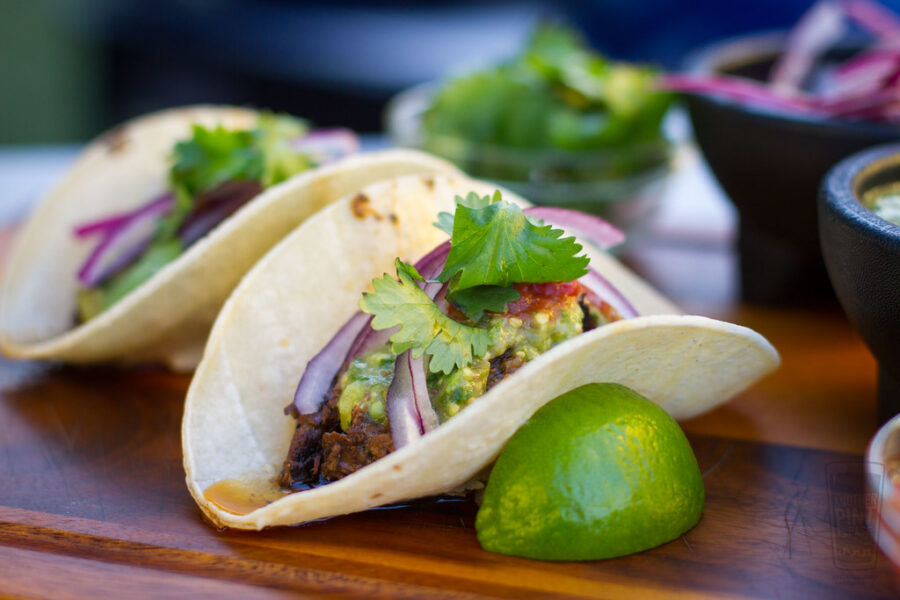Innovation was on the menu at the 2023 IFMA Presidents Conference.
International-inspired fusion dishes, a growing need for interconnected and actionable data, and emerging store formats and points of sale are all impacting the food-away-from-home ecosystem in major ways, and IFMA and industry stakeholders are evolving to meet these changes.
Innovation in International Flavors Leading to Fusion Cuisine
During the conference, IFMA hosted an event called “The Taste of Food-Away-From-Home Innovation” which featured several interesting combinations of international flavors and more typical restaurant fare.
Hosted at Copper Canyon, a meeting space designed like an authentic country mining town, the event allowed food manufacturers to showcase many interesting and delicious options.
Pumpkin spice even made the menu as Hormel Foods shared ham biscuits made with Cure 81 pumpkin spice ham.
Ventura Foods had Korean smokehouse short rib sliders available to sample. The product combined Korean flavors in an accessible, bar-friendly format.
Meanwhile, Wayne Sanderson Farms shared gochujang honey-glazed thigh meat rangoons with pickled ramps and Korean BBQ power, once again showcasing the growing importance of international flavors for foodservice operators.
At the IFMA Awards Reception, Frito-Lay debuted a packaging innovation that allows its Tostitos and Doritos to be turned into a carry-along taco bowl – servers simply rip open a wide-mouth bag of either chip before adding taco meats and toppings for a portable taco bowl perfect for music festivals, boardwalks, or other foodservice opportunities where diners are out and about.
Restaurant Operators Adjust to New Normal with Updated Formats
Valerie Gong, a managing director and partner with Boston Consulting Group, shared that off-premise foodservice consumption has grown quickly since the pandemic; she also noted that although growth may slow, it appeared that volume was here to stay.
“Across the customer journey, we’re going see more AI, self-ordering kiosks, and drive-thrus; we’re going to see more robotics and automation, including things like fully autonomous kitchens. And we’re going see a more digital experience for the customer, all enabled through a connected digital and tech ecosystem,” she said.
To this end, many QSR brands are working to install multiple drive-thru lanes, leverage mobile ordering systems, cut down on in-store seating, and devise ways to leverage loyalty program data to better meet consumer needs.
These themes were also explored in a presentation from Mastercard’s Chris Ritter. He noted between 50% and 70% of QSR sales are made via the drive-thru lane, and pointed to Taco Bell’s two-story concept in Minnesota as an example of how established companies are working to better meet consumer needs.
Maeve Webster, president of Menu Matters, noted that 43% of Gen Z survey respondents said they were cooking at home rather than dining out due to higher prices, and that formats like pop-up restaurants at breweries are gaining popularity with this cohort.
Empowering Business Through E-Commerce and Reliable Data
Anyone who has attended a conference knows 7:00 a.m. sessions aren’t always the most lively or well-attended, but the “It’s All In The Data” session, featuring leaders from Hormel Foodservice, DOT Foods, and GS1 US, broke away from that norm.
During the session, industry stakeholders discussed pain points in data transfer when it comes to hosting items on foodservice e-commerce sites. The robust discussion stressed the importance the industry places on e-commerce today.
In a separate session dubbed “Technology and the Changing Go-to-Market,” Southwestern Traders president Terry Walsh noted that by partnering with Cut+Dry to enable an e-commerce platform, his organization had seen a 25% boost in sales, with 90% of that increase coming from existing customers.
Innovation in the Association Space
IFMA leads the way by evolving in the association space, as well. The organization unveiled its Level Up 2027 plan to be more inclusive of all parts of the FAFH ecosystem and to better connect all stakeholders therein.
“This isn’t just about words or a book that we’re going to put away – it’s more values empower our ability to level up to meet you where your businesses are today. And we mean to make sure we keep helping them evolve. And that’s the most important part of your evolution,” said IFMA CEO Phil Kafarakis.
To this end, for the first time in 70 years the association is expanding its ranks beyond just foodservice manufacturers to include other stakeholders, including operators, distributors, and service providers.
“Our new membership structure is going to help you because it’s in a new sea of change, in the spirit of transformation and inclusion. The IFMA of 2024 and beyond is going to be dedicated to your diverse needs and address our industry challenges in a new way. By bringing the food-away-from-home ecosystem together, we can create opportunities for different segments to work collaboratively on solutions that are critical in our industry,” Kafarakis added.











